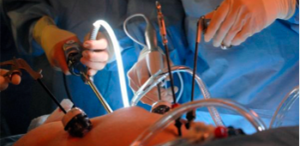
Bariatric surgery has proven to be the most efficient and effective treatment for obesity. With more and more patients choosing a surgical procedure to lose weight, the gastric bypass and the gastric sleeve are now the most popular weight loss procedures worldwide. 45.9% of bariatric surgery patients around the world undertook the gastric sleeve surgery, and 38.3% the Roux-en-Y gastric bypass, between 2014 and 2018 according to the IFSO Global Registry Report of 2018.
These types of surgeries have proven great benefits for obese patients, not only allowing them to lose weight, but to ameliorate and even cure many metabolic diseases, such as type 2 diabetes, and other illnesses like heart disease, and sleep apnea.
If you’re interested in knowing which weight loss surgery is the right choice for you, please, call LIMARP International Center of Excellence for Obesity. Our facilities have been recognized as a Center of Excellence by the Surgical Review Corporation, allowing us to be one of the first clinics to be recognized with this distinction outside the United States. We are located at Tijuana, Mexico, just 15 minutes away from the International Border Crossing of San Ysidro. Our head surgeon, Dr. Liza María Pompa González, has been the first female surgeon to be recognized as a Surgeon of Excellence by this corporation. Send us a message or give us a call.
We’ll be glad to answer all your questions.
As any medical procedure, bariatric surgery might pose risks for some patients, depending on their pre-existing conditions and commitment to a healthy lifestyle after their surgical treatment.
Recent studies have revealed a tendency in bariatric surgery patients to develop mild to moderate hypoglycemia months or years after their bariatric surgery. Post-bariatric surgery hypoglycemia, also known as reactive hypoglycemia and late dumping syndrome, is a metabolic complication in which a spike in glucose levels after eating a meal stimulates a high secretion of insulin which leads to low blood sugar.
Reactive hypoglycemia has been more frequently linked to patients who had a Roux-en-Y gastric bypass. The first report of this link was done in 2005. However, the risk of developing reactive hypoglycemia has also been found in patients that underwent laparoscopic sleeve gastrectomy, also known as the gastric sleeve.
Incidence
What has been observed about reactive hypoglycemia after gastric sleeve surgery and Roux-en-Y gastric bypass is that it usually manifests itself 1 to 3 years after the surgical procedure in a prevalence of 30% of bariatric surgery patients. This percentage of patients experience a mild to moderate hypoglycemic condition 2 to 4 hours after eating a meal. The incidence of bariatric surgery patients that suffer a severe episode of hypoglycemia after gastric sleeve and gastric bypass surgery is much lower. Research studies have reported a prevalence between 0.5 and 2%.
Symptoms
Symptoms of reactive hypoglycemia include sweating, palpitations, shaking, hunger, confusion, drowsiness, odd behavior, speech difficulty, incoordination, nausea, headache, pale skin, and weakness. During extreme episodes, patients can experience seizures and fainting. Severe cases of reactive hypoglycemia after gastric sleeve surgery can influence the patient’s quality of life and weight loss in the long term, and it could even lead to require a pancreasectomy.
Although what causes hypoglycemia after gastric sleeve surgery, and bariatric surgeries in general, remains unknown, it has been suggested that an increment of glucagon-like-peptide 1 (GLP-1) secretion, in addition to a higher insulin sensitivity, may play a very active role.
Risk Factors
Patients that had pre-operative symptoms of hypoglycemia might experience reactive hypoglycemia after gastric sleeve surgery.
Some studies report that people without a history of diabetes before their surgery face a higher risk of developing hypoglycemia after bariatric surgery. However, recent research has shown that patients who had diabetes before their operation can also develop hypoglycemia after gastric sleeve surgery, even in the same incidence than those patients without any diabetes history.
According to a very recent article published in the Obesity Surgery Journal about a sample trial with 338 bariatric surgery patients, patients who developed reactive hypoglycemia were younger, had lower BMI before surgery, and had a worse lipid profile in comparison with patients who did not experience hypoglycemic events.
Preventive Measures
Candidates for bariatric surgery should be properly evaluated to detect any previous symptoms of hypoglycemia and identify who might be at a higher risk of later developing reactive hypoglycemia after gastric sleeve surgery. The early detection of this condition will allow the implementation of preventive measures, such as instructing patients on how to detect hypoglycemia symptoms, and which nutritional therapies might be available for them.
While most cases can be resolved with a low-carbohydrate diet, some cases require medical therapies with acarbose and diozoxide, and severe cases could require pancreatectomy.
Here is a list of preventive measures for patients with high risk of developing hypoglycemia after gastric sleeve surgery:
- Restrict daily portions of carbohydrates to a maximum of 30 gr per meal and 15 gr of snacks.
- Choose low-glycemic carbohydrates, such as:
- Natural oats
- Oat bran cereal
- Beans and legumes, like soybeans, lentils, garbanzo, and black-eyed beans
- Bean products, like hummus, and tofu
- Pearled barley
- Yams
- Fruits like grapefruits, apples, pears, peaches, apricots and berries
- Some whole grain breads
- Whole grain crackers
- Avoid high-glycemic carbohydrates, such as:
- Refined cereals
- Regular pasta
- Starchy vegetables, like potatoes
- White rice
- Popcorn
- Pretzels
- Chips
- Fruits like bananas, pineapple, mango, watermelon, and grapes
- Sodas, sweetened iced tea, juices
- Regular bread or any bread made of refined flour
- Sweets and junk food
- Include 15 gr of healthy fats in your meals, and 5 gr in snacks
- Be especially aware of your protein intake. Make sure you eat between 60 to 80 gr of protein a day.
- Space your meals and snacks between 3 to 4 hours apart
- Avoid drinking liquids while you eat. Drink liquids either 30 minutes before or 30 minutes after your meals. You should drink at least 2.5 litters of water each day.
- Avoid drinking alcohol.
- Avoid drinking anything with caffeine
- Take vitamins and minerals supplements prescribed by your doctor
If you experience any symptoms of hypoglycemia after gastric sleeve surgery, make sure you tell your doctor. A close monitor on your eating habits and vitamin intake can make a true difference.
Contact us
If you would like to know more about risks and preventive measures for hypoglycemia after gastric sleeve surgery, or if you are considering a surgical or non-surgical obesity treatment, call us at our clinic, LIMARP International Center of Excellence for Obesity, located at Tijuana, Mexico. Our team of experts will be very glad to help.


